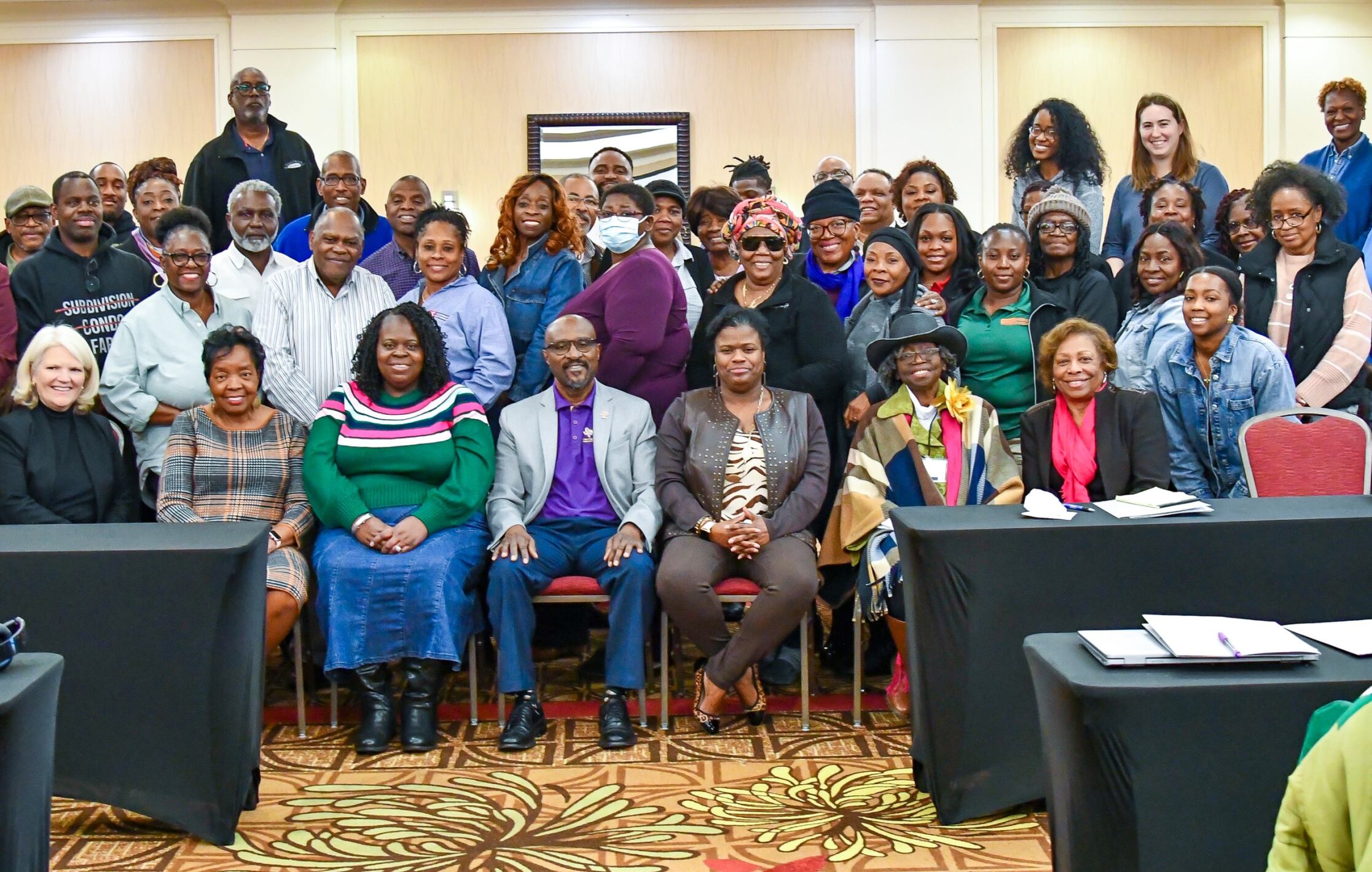To prepare historically underserved farmers and ranchers for natural and manmade disasters, the 1890 Extension Disaster Education Network (EDEN) Advisory Group offered a three-day boot camp for farmers and Cooperative Extension personnel.
The 1890 Sustainable Agriculture Research and Education (SARE) Farm Bootcamp Workshop took place Feb. 7-9 in Atlanta, Georgia. Approximately 50 farmers and Cooperative Extension personnel attended. Participants traveled from states representing the 1890 region.
Fort Valley State University (FVSU) and Prairie View A&M University (PVAMU) served as the host institutions for this event. Dr. Noel M. Estwick, assistant professor and research scientist for PVAMU’s College of Agriculture, Food and Natural Resources (CAFNR), serves as the principal investigator (PI) of the SARE Research and Education Grant that funded the boot camp. Other partnering institutions of the grant include Florida A&M University(FAMU) (Kimberly Davis), North Carolina A&T State University (NCAT) (Dr. Michelle Eley), Tuskegee University (Dr. Rashidah Farid), and the University of Arkansas at Pine-Bluff (UAPB) (Dr. Henry English/Karen Lee.)
“The purpose of the event was to assemble 1890 Cooperative Extension personnel and farmers and collectively engage them in training by identifying resources, facilitating discussions and engaging them in research-driven activities,” Estwick said. These activities included focus groups and in-depth interviews to identify ways of collectively addressing disaster-related challenges experienced by historically underserved farmers and ranchers.
“Marginalized communities are often disproportionately impacted by disasters and experience challenges, such as limited access to resources. Hence, the research team saw the need to assess the role culture plays in how historically underserved farmers and ranchers prepare for, cope with and respond to disasters,” Estwick said.
Topics discussed during the workshop included crisis communications for disasters, assessing and planning for agricultural risks, mental health, getting the farm ready for disasters, estate planning, and disaster recovery resources for producers and ranchers.

Farmers and Cooperative Extension personnel participate in focus groups. Photo courtesy of FVSU Agricultural Communications.
Trinice Holden, a farmer from Polk County, Georgia, who attended the boot camp, said she found the information about risk assessments to be incredibly useful.
“I plan to go home and fill out my risk assessment worksheet. I needed that,” Holden said thankfully.
Holden, who raises black angus cows on 120 acres, said there is always a disaster waiting to happen. Taking on her family farm, which was passed down to her, has come with a few learning curves.
“Fort Valley Extension has been very helpful,” she said, referring to the advice and technical assistance she’s received from Dr. Niki Whitley, FVSU animal science Extension specialist, and Handy Kennedy, founder of AgriUnity.
Holden said she often shares what she learns from Extension with other limited resource farmers.
“I already took the information that I learned from the risk assessment session, and I’m sending it to three other ranchers. It was needed. It was key. I really appreciate the fact that this was held,” said the 50-year-old.
Jeremy Peaches, urban agricultural specialist for PVAMU’s Cooperative Extension, also attended the boot camp to disseminate information to ranchers and producers in his area.
“It made me think more about preventative measures. We’ve recently had three disastrous events happen to us, and I think we were lightly prepared. I loved that the boot camp had presentations, forums and templates, so we did not have to do much gathering. Everything was accessible and efficient,” Peaches said.
Peaches, who works closely with historically underserved farmers in Texas, said this type of workshop builds resiliency among African American farmers and producers.
“The more information producers have, the more they can be able to bounce back from a disaster. It’s important to have contingency plans,” he said.
Likewise, Michael Brown of Quincy, Florida, said he left the boot camp with a list of tasks that he plans to implement, involving estate planning, risk management, and upgrading his insurance. The fifth-generation farmer grows collard, turnip, and mustard greens that he provides to a local farm-to-school program.
“Farming is a risk already,” said the 55-year-old. He mentioned how a disaster brings even greater risks. He recalled the aftermath of Hurricane Michael in 2018, which still lingers in his mind.
Although the Florida farmer admits his busy schedule can keep him from attending workshops, he said the four-hour drive from Quincy, Florida, to Atlanta was worth it.
“I stopped everything I was doing to make sure I could attend,” he said. Brown also expressed that he was grateful for the invite from FAMU Cooperative Extension.
“I trust Florida A&M University. I trust what they say,” he said, referencing Extension and the information they provide for farmers.
Lastly, Brown expressed his gratitude for the grant funding, which provided hotel lodging, meals, and mileage reimbursement for attendees.
“If the grant didn’t take care of my hotel, I probably wouldn’t have come. I appreciate the program. This is a platform to bring farmers together,” Brown said.
For more information about EDEN and activities from the 1890 EDEN Advisory Group, visit https://extensiondisaster.net/.
The project team is as follows:
Dr. Noel M. Estwick, Prairie View A&M University, PI
Dr. Marco T. Robinson, Prairie View A&M University
Dr. Michelle Eley, North Carolina A&T State University
Kimberly J. Davis, Florida A&M University
Dr. Henry English, University of Arkansas Pine Bluff
Finis Stribling III, Tennessee State University
Dr. Rashidah H. Farid-Tilghman, Tuskegee University and
Dr. Saundra Glover, University of South Carolina, Project Evaluation
For more information about this article,Contact:
FVSU Agricultural Communications
(478) 825-6345

